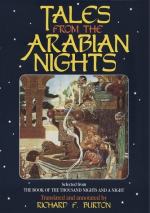[FN#231] Arab. “Khayt hamayan” (wandering threads of vanity), or Mukhat al-Shaytan (Satan’s snivel),=our “gossamer"=God’s summer (Mutter Gottes Sommer) or God’s cymar (?).
[FN#232] These lines occur in Night xvii.; so I borrow from Torrens (p. 163) by way of variety.
[FN#233] A posture of peculiar submission; contrasting strongly with the attitude afterwards assumed by Prince Charming.
[FN#234] A mere term of vulgar abuse not reflecting on either parent: I have heard a mother call her own son, “Child of adultery.”
[FN#235] Arab. “Ghaza,” the Artemisia (Euphorbia ?) before noticed. If the word be a misprint for Ghada it means a kind of Euphorbia which, with the Arak (wild caper-tree) and the Daum palm (Crucifera thebiaca), is one of the three normal growths of the Arabian desert (Pilgrimage iii. 22).
[FN#236] Arab. “Banat al-Na’ash,” usually translated daughters of the bier, the three stars which represent the horses in either Bear, “Charles’ Wain,” or Ursa Minor, the waggon being supposed to be a bier. “Banat” may be also sons, plur. of Ibn, as the word points to irrational objects. So Job (ix. 9 and xxxviii. 32) refers to U. Major as “Ash” or “Aysh” in the words, “Canst thou guide the bier with its sons?” (erroneously rendered “Arcturus with his sons”) In the text the lines are enigmatical, but apparently refer to a death parting.
[FN#237] The Chapters are: 2, 3, 36, 55, 67 and the two last ("Daybreak” cxiii. and “Men” cxiv.), which are called Al-Mu’izzatani (vulgar Al-Mu’izzatayn), the “Two Refuge-takings or Preventives,” because they obviate enchantment. I have translated the two latter as follows:—
“Say:—Refuge I take with the Lord
of the Day-break *
from mischief of what
He did make *
from mischief of moon
eclipse-showing *
and from mischief of
witches on cord-knots blowing *
and from mischief of
envier when envying.”
“Say:—Refuge I take with the Lord
of men *
the sovran of men *
the God of men *
from the Tempter, the
Demon *
who tempteth in whisper
the breasts of men *
and from Jinnis and
(evil) men.”
[FN#238] The recitations were Nafilah, or superogatory, two short chapters only being required and the taking refuge was because he slept in a ruin, a noted place in the East for Ghuls as in the West for ghosts.
[FN#239] Lane (ii. 222) first read “Muroozee” and referred it to the Muruz tribe near Herat he afterwards (iii. 748) corrected it to “Marwazee,” of the fabric of Marw (Margiana) the place now famed for “Mervousness.” As a man of Rayy (Rhages) becomes Razi (e.g. Ibn Faris al-Razi), so a man of Marw is Marazi, not Muruzi nor Marwazi. The “Mikna’ " was a veil forming a kind of “respirator,” defending from flies by day and from mosquitos, dews and draughts by night. Easterns are too sensible to sleep with bodies kept warm by bedding, and heads bared to catch every blast. Our grandfathers and grandmothers did well to wear bonnets-de-nuit, however ridiculous they may have looked.




